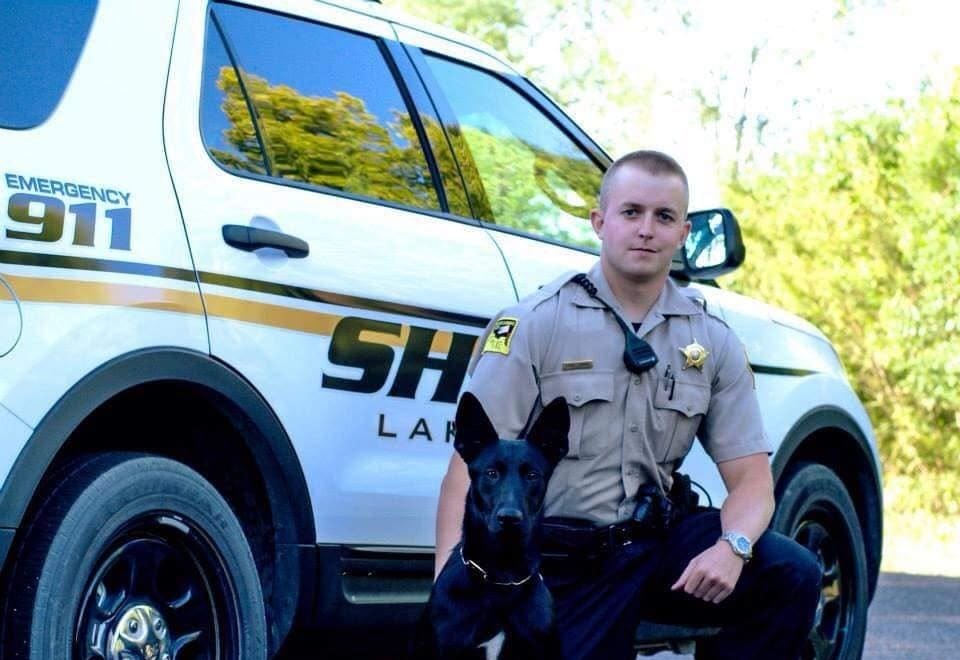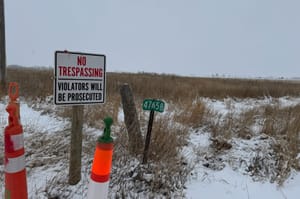MITCHELL, S.D. – As guests file into the meeting hall at the Davison County Fairgrounds, organizers grab more chairs. The crowd is bigger than they anticipated — more than 100 people are here for this Thursday afternoon ceremony.
Outside in the 40-degree weather – warm for January – the graduates sneak in one last smoke break.
Davison County jail administrator Grant Lanning walks in 30 minutes before the ceremony in full uniform, wearing his bulletproof vest, Taser and firearm. The deputy sheriff catches up with his fellow law enforcement officers and texts with friend Dexton Hicks. They met nearly 20 years ago on their way to National Guard basic training. They’ve been texting daily the past couple weeks.
“Good luck brother,” Dexton writes.
A few days ago, Grant marked his 12th anniversary of being sworn in as a law enforcement officer. “A lot of signs,” he replied to Dexton.
The program
Today is not about a diploma or a degree. It’s much bigger, more valuable. Today is about second chances and 18 months of hard work.
The four graduates — all women — completed 860 hours of treatment all told, spent 954 hours sharing in support groups, and stayed sober from drugs and alcohol for a combined 2,228 days.
Today they graduate from James Valley DUI and Drug Court. The problem-solving court, as the state calls it, was created in 2007. Participants, who have felony driving under the influence and drug convictions, avoid prison by going through community-based, intensive outpatient treatment. They must volunteer for the program and be accepted.
They have to want it.
There are extensive requirements, including regular court appearances, substance abuse and mental health treatment, intensive supervision including random drug and alcohol testing, keeping a job and connecting with the recovery support services. If they fail on any count, a judge can send them to prison.
The focus is on rehabilitation instead of punishment, which also saves taxpayer money.
Completing the program is a big deal, worthy of a graduation celebration. The court holds a handful a year, each with a keynote speaker. Sometimes it’s a past graduate who’s able to relate to life after court. Other speakers have included sheriffs, judges and community members.
While planning for this January graduation, administrators discussed their options and thought Grant would make a solid keynote speaker.
As the jail administrator, he’s seen the graduates, sometimes multiple times in the Davison County Jail, and he’s been a supporter of the program, rarely missing a graduation.
Court coordinator Sharon Kraft emailed Grant, “We generally ask that you speak 10 to 15 minutes.”
No problem, he replied. He’d have a few weeks to write it.
Familiar faces
Today’s ceremony begins with Donna Bucher, the James Valley Drug and DUI Court judge, welcoming the crowd and introducing Grant.
His friend Dexton wanted to be here. He’s gone through a similar experience and encouraged Grant to speak out. But Dexton, who lives in Kansas City, couldn’t make the drive. So while Judge Bucher mentions his bio in the graduation program, Grant, standing in the back, pushes record on his phone.
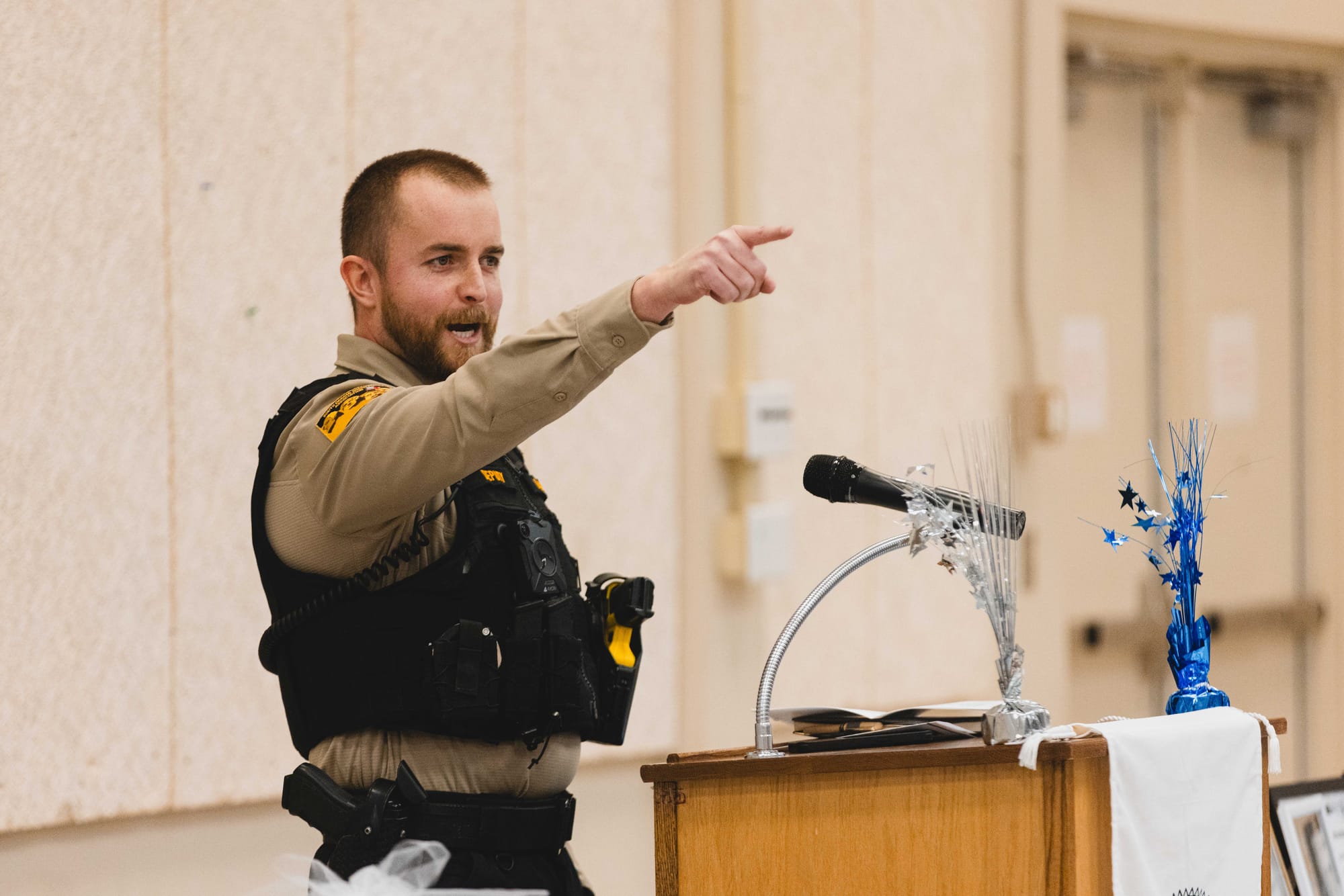
“Why would we invite someone like him to speak at a graduation?” Bucher asks. “He’s law enforcement through and through. He is also a wonderful human with a caring heart, and he wants to see people be successful.”
The judge calls Grant to the lectern, and the audience applauds.
“A lot of familiar faces here,” Grant smiles. “This is probably one of the only happy times some of you have seen me.”
He’s met them in jail and even arrested some of them, and not just the graduates. The audience is full of family, friends, alumni and current court participants.
Grant continues on with what you’d expect at a graduation speech, what the graduation coordinators were hoping for. Grant tells those in the audience their job is to support the graduates. He points to the nearly dozen law enforcement officers standing in the back.
“They’re not here to see you fail. They’re here to support you.”
His secret revealed
What no one knows, not the coordinators or his colleagues, is that Grant walked up to that oak lectern with two speeches.
One contains the message the court envisioned: That when people down on their luck make poor choices in life, it doesn’t define them.
That’s the one he wrote first, the easy one. The one that gave him an out. An opportunity to delay his truth, a reprieve from revealing his secret. Because the second speech Grant wrote is more honest and life-defining.
After being introduced, Grant walked up with both speeches tucked in a black notebook. When he pulled the pages out, on top was the truth, what he’d been hiding for years.
Grant took it as a sign. Let’s do this. Let’s see what happens.
“So who am I? Well, I’m a small-town kid that grew up with a dream to always be a cop,” Grant continues.
He tells how he went to South Dakota State University to study sociology. How he joined the National Guard and during college was deployed to Afghanistan. How he returned, finished his degree and started in law enforcement.
At first, he says, he wanted to put everyone in handcuffs. Now, Grant believes in finding the best solution for someone who’s struggling.
“So,” Grant clears his throat. “When they asked me to speak, they’re going to get a little more than they bargained for.”
Grant's face starts to redden. He gets that way when he’s nervous.
“You talk about sober days, right?” he checks with the graduates, then pauses. “2,977 sober days for me.”
Eight years, one month, three weeks and six days without alcohol. There it is. The secret is out. Grant Lanning is an alcoholic.
The audience claps. Not what he was expecting.
Grant continues over the applause. “You know what’s really hard? All those people I work with, most of them don’t know.”
“I didn’t know,” Judge Bucher says from the front row.
“I know you didn’t.” Maybe now she will let him go a little longer with his speech, Grant jokes.
'Share your story'
He goes on to disclose more.
How he justified his drinking with what he saw in Afghanistan, what he saw as a cop, the death he dealt with as part of his duties. How he hid bottles and was deep into his addiction when he was enforcing the law.
How even when he got sober, he was a miserable person to be around, a dry drunk. What helped him, he says, was helping others.
Toward the end, he tells the graduates how proud he is of them. To keep coming back to show other participants sobriety is possible.

“Don’t be afraid to share your story,” he concludes, “because you never know who you might help.”
The audience gives him a standing ovation.
Grant’s boss, Davison County Sheriff Steve Harr, enters from the back. While he missed Grant’s speech, the sheriff already knows. Grant told him during his job interview three years ago.
Harr had no reservations hiring Grant. “I've been around the block enough doing this job to realize that people can have issues in their personal life and change.”
Harr’s former boss, previous Sheriff Steve Brink, also struggled with alcohol. Like Grant, Brink publicly shared about his recovery at a James Valley Drug and DUI Court graduation.
Ten minutes after Grant sat down from his speech, he texted Dexton. “Holy sh– I did it.”
“F– yea you did!!!” replied Dexton, who celebrates 11 years of sobriety this month.
“I’m ready for my story to start helping others,” Grant texts back, sending Dexton the recording.
Wanting it
Months after his graduation speech, Grant sits down for an interview in a Mitchell deli booth.
Since the ceremony, he’s run into a few who were in the audience at graduation, arrested and back in jail.
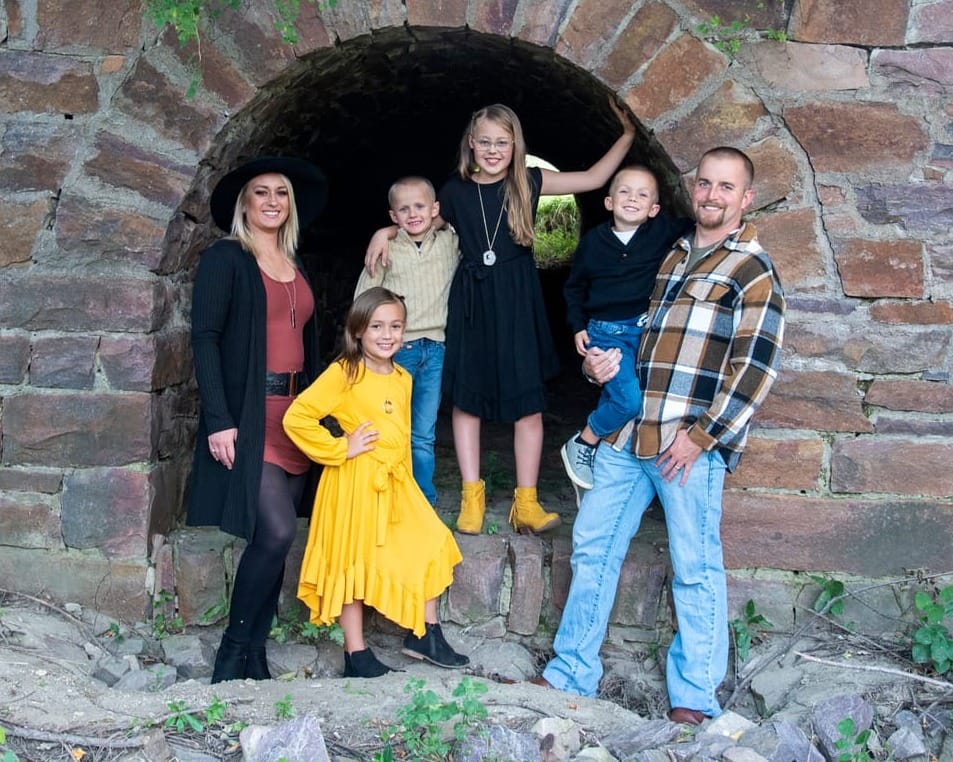
One of them told him, “You get it.” Grant replied, “I do get it, but you have to want it. You have to be able to do this.’"
After years of drinking, Grant knew when he was ready. For years, he thought he was good at hiding his drinking and the bottles. That his wife, Sydney, believed he was changing his car’s oil when he went out to his garage.
“I knew I had a problem for a long time, but I was not ready to look in the mirror and accept it,” Grant says.
It was his wife who provided the reflection. One day, Sydney called his bluff. She grabbed Grant’s purple Powerade, ready to take a sip, knowing it was spiked with vodka. She was pregnant.
“Don’t drink it,” he stopped her.
“Where is it?” she asked.
In the garage, back of the freezer, he acknowledges.
She helped him throw it all out. Even the cooking wine.
Recovery isn’t just about being sober. For Grant, it’s about working on himself, his issues and sharing his story to help others.
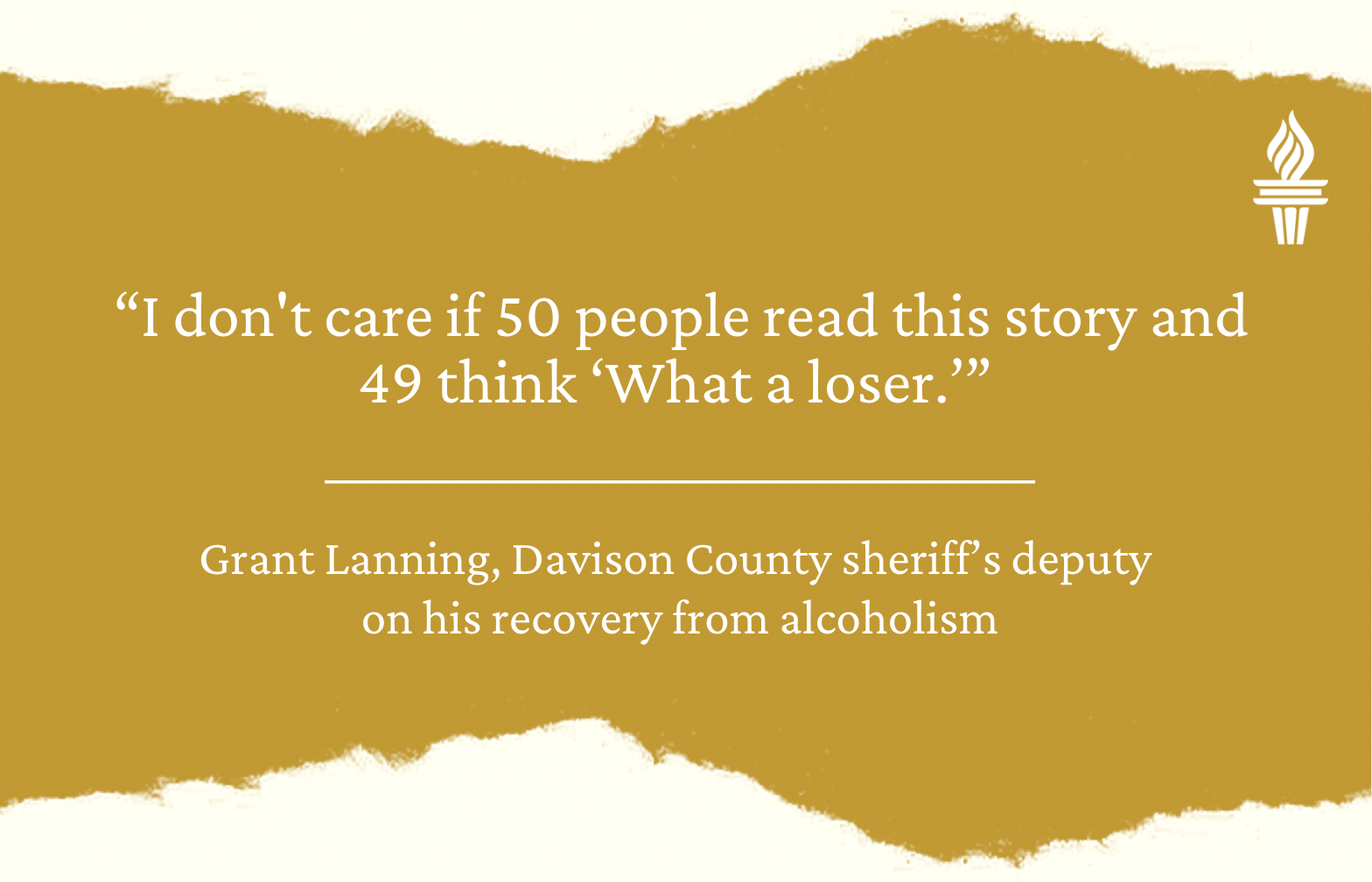
Grant feels lighter after going public. No fallout, yet. Nor does he particularly care what others think.
The graduation speech wasn’t about him. This story isn’t about him. “Look at me. Look how awesome I am now because I'm sober," he mocks. “No. That's not what it's about.”
"I don't care if 50 people read this story and 49 think ‘What a loser.’”
Grant shares for one – that one person who may be struggling, looking for a sign to get sober. Maybe that person is even wearing a badge.
The possibility of helping one person is worth telling it all.

Megan Luther is a freelance journalist based in Mitchell. She has been in recovery for five years.
This story was produced by South Dakota News Watch, an independent, nonprofit organization. Read more stories and donate at sdnewswatch.org and sign up for an email to get stories when they're published. Contact Megan Luther at megan.luther@sdnewswatch.org.

